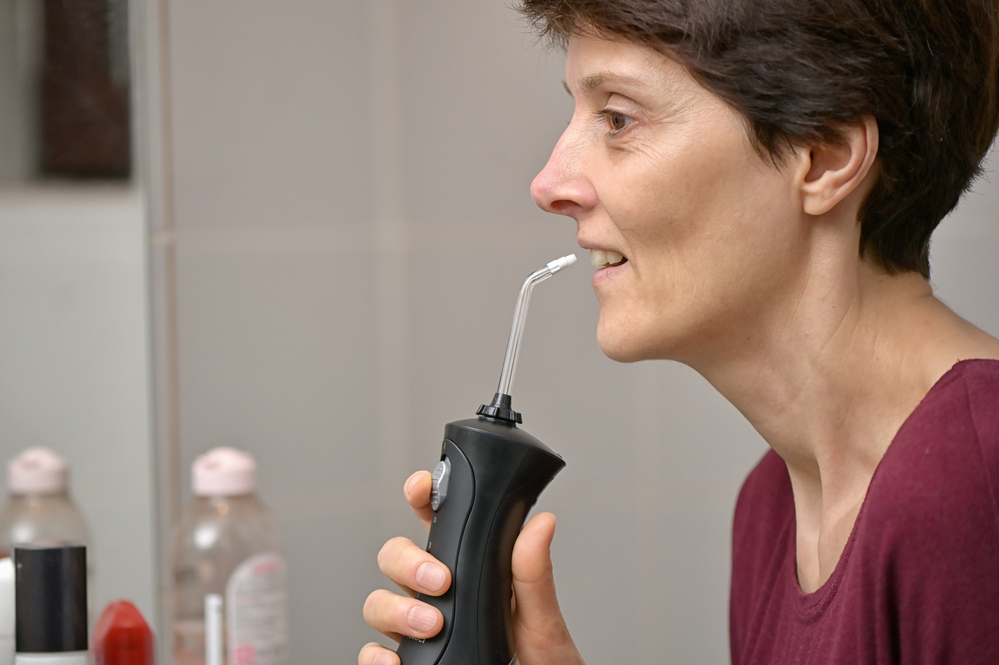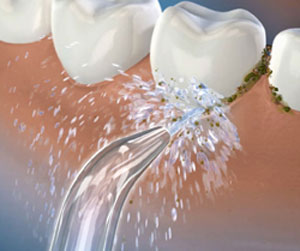Yes, water flossers really help. Water flossers use a combination of pulsating water and air to remove food particles, plaque, and bacteria that can cause cavities and gum disease. The pressure generated by the water helps to dislodge hard-to-reach particles that regular brushing might not be able to reach.
This is especially helpful for those with braces or other dental appliances which may make it difficult to brush thoroughly. Furthermore, since the device does not require toothpaste or mouthwash – just plain tap water – it is an affordable option for many people looking for an easy way to improve oral hygiene. Regular use of a water flosser has been shown in clinical studies to reduce gingivitis and bleeding gums as well as reduce bad breath caused by bacterial buildup on teeth surfaces.
Water flossers offer a great way to improve oral health. Studies have shown that using a water flosser can reduce plaque and gingivitis more effectively than regular string floss, as well as helping to reduce cavities and bad breath. Water flossers are also easier to use and require less time than traditional string floss.
Overall, it’s clear that water flossers do help with oral hygiene, making them an excellent choice for keeping your teeth healthy!
Difference between Waterpik And Water Flosser
Waterpik and Water Flosser are two popular methods of cleaning teeth that utilize water pressure to dislodge food particles from between teeth. The main difference between the two products is in their design; a Waterpik uses an oral irrigator, which sprays pressurized streams of water for the user to direct at their teeth, whereas a Water Flosser uses a cordless device with an on-off switch, providing bursts of pulsating water that is directed into pockets around each tooth. Additionally, since they use different designs and techniques to clean your mouth, they also have different effects when it comes to plaque reduction and gum health benefits.
Does Water Flosser Remove Plaque
Water Flossers are a great tool for removing plaque from between teeth and along the gum line. They can help to reduce the amount of plaque buildup in hard-to-reach areas that regular brushing may miss. The water pressure created by a Water Flosser helps to remove bacteria, food particles, and other debris that accumulate throughout the day.
Regular use of a Water Flosser can help improve overall oral health and hygiene, as well as reduce your risk of cavities and gingivitis.
Do Dentists Recommend Water Flossers
Dentists often recommend water flossers to their patients as a way to supplement traditional flossing. Water flossers use a stream of pressurized water to help remove plaque and food particles from the teeth, providing better overall oral hygiene than regular string dental floss can achieve. Additionally, waterflossers are easier on sensitive gums than string-based devices, making them an ideal choice for people who struggle with standard brushing and/or flossing methods.
Do Water Flossers Work Reddit
Water flossers are a popular alternative to traditional string flossing and have been gaining traction on Reddit in recent years. Studies show that water flossers can effectively reduce plaque, gingivitis, and bleeding of the gum tissue when used regularly. Users report that they are easy to use and effective at cleaning hard-to-reach areas around teeth.
While opinions vary on whether water flossers work better than traditional string flossing, many users find them more convenient and enjoyable to use overall.
Can Waterpik Damage Gums
Waterpik is a popular device used for irrigating teeth to help remove plaque and debris from between teeth, but it can be damaging to your gums if not used correctly. If the pressure setting on the Waterpik is too high or you are using it too often, this could lead to gum recession and other damage. It is important to make sure that you adjust the settings based on what your dentist recommends for you and use it no more than two times per day.
Water Flosser Reviews
Water flossers are an easy and effective way to help improve your oral hygiene routine. With a wide variety of models available on the market, it’s important to read reviews before investing in one. Look for reviews that discuss the effectiveness of various water flossers in removing plaque and food particles from hard-to-reach areas between teeth, as well as how comfortable they are to use.
Additionally, many reviews provide insight into battery life, noise level, portability, and other features that can make using a water flosser more enjoyable.
Ada Approved Water Flosser
Ada Approved Water Flossers are a great way to maintain proper oral hygiene. They use a combination of water pressure and pulsation to clean between teeth, around braces, and below the gumline. These flossers can help reduce plaque buildup and inflammation caused by gingivitis, while also promoting fresher breath.
Additionally, they are easy to use and require no string or thread like traditional flossing methods.

Credit: www.ecodentalpearland.com
Do Dentists Actually Recommend Water Flossers?
Yes, dentists actually recommend water flossers. Water flossers are an effective tool for cleaning between teeth and below the gumline. They are especially helpful when traditional string floss is difficult to use.
Benefits of using a water flosser include:
– Easier access to hard-to-reach areas between teeth
– Improved ability to remove plaque from under the gums
– Quick and easy way to keep your mouth healthy
Water flossers can be used by anyone, but they are particularly beneficial for people with braces or other orthodontic appliances, those with limited dexterity in their hands, or those who suffer from periodontal disease.
Do Orthodontists Recommend Water Flossers?
Orthodontists may recommend water flossers as an adjunct to traditional brushing and flossing. Water flossers are effective at removing plaque, bacteria, and food particles from areas that conventional oral hygiene methods cannot reach.
Benefits of using a water flosser:
• Easier access to hard-to-reach places in the mouth
• Better removal of plaque, bacteria, and foreign objects
• Less time spent on oral care routines
• Lower risk for periodontal problems
Overall, water flossers can help improve overall oral health when used along with regular brushing and dental visits. They can also be helpful for people who have braces or other orthodontic devices installed in their mouths.
Is a Waterpik Really Better Than Flossing?
A Waterpik and flossing are both effective ways to clean between teeth, but a Waterpik may be more beneficial in certain cases.
Advantages of using a Waterpik:
– Deep cleaning up to 3mm below the gum line
– Helps reduce plaque and gingivitis
– Can reach hard to access areas with ease
– Easier for people with braces or bridge work
The pressurized water from a Waterpik can help get rid of food debris and bacteria that traditional flossing may miss. It’s also gentler on your gums than regular string floss, making it an ideal choice for those who have sensitive gums or difficulty maneuvering dental floss around their teeth.
Floss or Water flosser | Which is More Effective? | Dentist Recommendation
Conclusion
Overall, the research indicates that water flossers can be an effective tool for improved oral hygiene. They are particularly beneficial to people with braces, large gaps between teeth, and other dental issues where brushing alone isn’t enough. While they may not dramatically improve your oral health overnight, regular use of a water flosser over time can make a big difference in reducing plaque buildup and preventing future problems.



